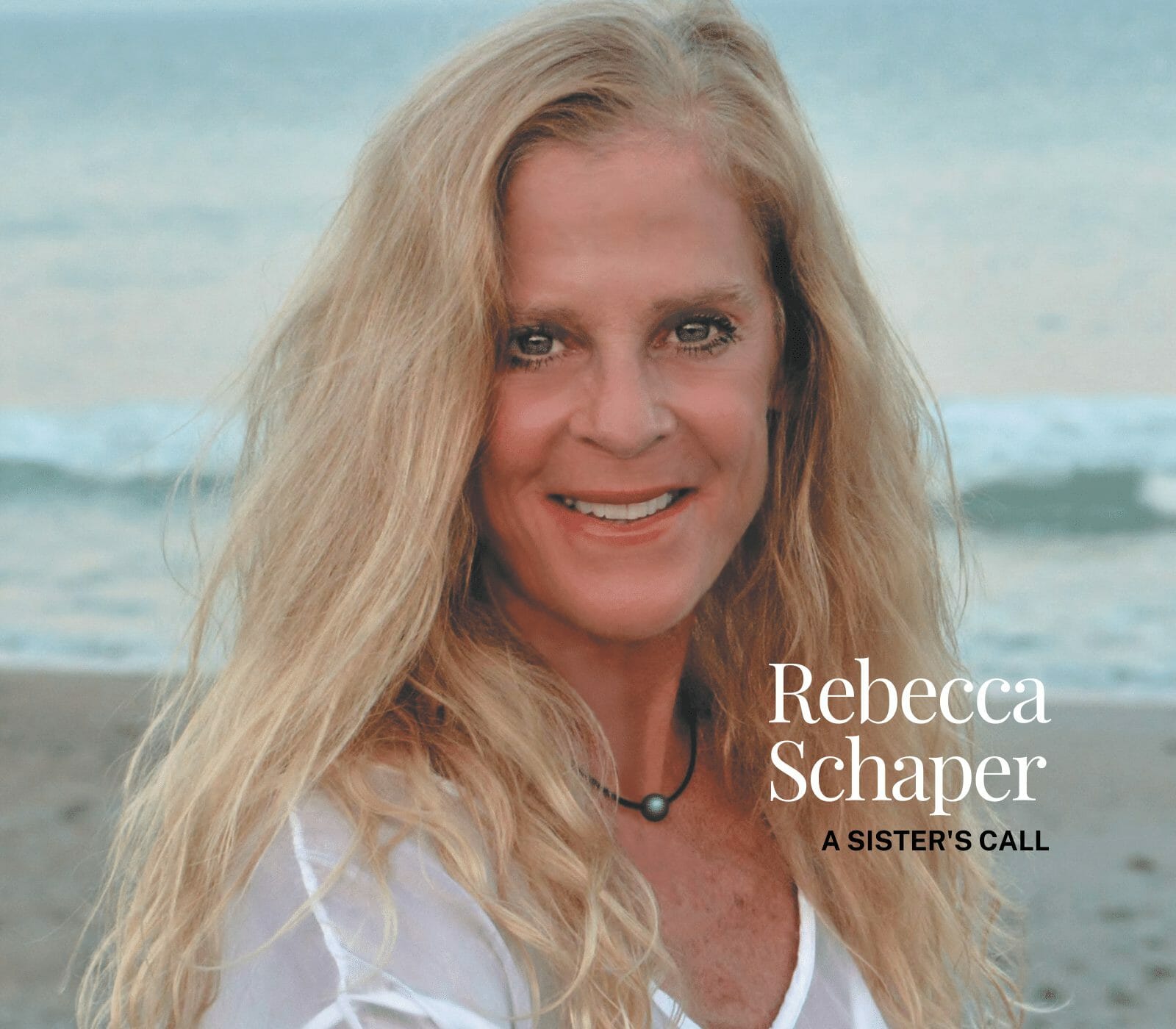Rebecca Schaper: A Sister’s Call

Rebecca Schaper is an author, filmmaker, philanthropist, mental health advocate, and spokesperson for mental-health awareness and spiritual development. She co-produced and directed the award-winning documentary A Sister’s Call. The film chronicles her mission to bring her brother Call Richmond Jr. back from the depths of homelessness and schizophrenia, all while seeking ways to heal herself and her family from the past. Her memoir, The Light in His Soul: Lessons from My Brother’s Schizophrenia, recounts the events in the film, supplemented by her intimate personal reflections on recovering from trauma and developing spiritual insight.
Slaying the Dragons of Mental Health – An Interview with Rebecca Schaper
To listen to the full interview of Rebecca Schaper by Sandie Sedgbeer from What Is Going OM on OMTimes Radio, click the player below.
Mental health has become one of the hottest topics of our era. We all have mental health, just as we all have physical and emotional health, and, just as we all struggle to stay in shape and manage our emotions at times, so, too, do we all face times when our mental health is affected by circumstances beyond our control. The events of this year being the perfect case in point.
The following interview is a conversation between Sandie Sedgbeer and author, filmmaker, philanthropist, and mental health advocate, Rebecca Schaper, which covers two important topics. The first is Rebecca’s own family story, chronicled in her award-winning documentary “A Sister’s Call,” and her book The Light in His Soul – Lessons from my Brother’s Schizophrenia, which have been hailed as essential for anyone who dares to see the miraculous gift that life presents us in our struggles, obstacles, and most difficult moments. The second is the launch of Sandie and Rebecca’s new Podcast, starting in 2021, which aims to shine a new light on mental health by expanding the conversation to cover areas that only just beginning to be examined.
SANDIE SEDGBEER: Rebecca, welcome. Your book The Light in His Soul – Lessons from my Brother’s Schizophrenia is a story that takes us on a journey through pain, sadness, and suffering. Of growing up with a mentally ill parent, child sexual abuse, parental suicide, and the 20-year disappearance and reappearance of your much-loved brother, Call. Tell us about your family background and Call’s disappearance.
REBECCA SCHAPER: My Father was a war hero. He had PTSD. My mother was a debutante. We lived in the south. We looked like this perfect family, but we weren’t. My mother was diagnosed with paranoid Schizophrenia, and my brother was as well. I grew up in a family with alcoholism, sexual abuse, mental health issues, and both parents died by suicide. In 1977, my brother Call dropped out of college with one semester left. Then my mother died by suicide, and Call took off. I was married by then. I searched for Call for a very long time. But I knew he was alive. Occasionally, he would pop back in and out, but I could never figure out how to truly bring him back home.
SANDIE SEDGBEER: And then in 1998, after 20 years of searching, incredible synchronicity brought him back into your life.
REBECCA SCHAPER: Yes. I will never forget that day. It still brings tears to my eyes. Call stayed at the Haven of Rest in Anderson, South Carolina, which takes in people with mental  health issues and homelessness. They run a Thrift Store, which helps support the homeless people and give them work, picking up donated furniture from people’s homes. Call, and another guy was collecting furniture from someone’s house. When they got back to the truck, Call noticed the name “Schaper” on the form. He went back to the house, knocked on the door, and said to the owner, “Marge, do you know who I am? I am Rebecca’s brother, Call Richmond.” Marge is my husband’s mother. “Oh my gosh, Call, come in.” she said, “You don’t know how happy your sister will be. Let’s call her right now.” I was living in Atlanta, Georgia. I got that Call at 11 in the morning, and I went, “Oh my God.” I later learned that he lived at the Haven of Rest, off and on for six years. And I had no idea that he was just an hour-and-a-half away from me. Of course, I drove straight there. We were in the parking lot of the Haven of Rest, and we hugged each other, and it was like ‘here’s this person, my brother, who I knew was always alive, and he’s standing right here in front of me. It was like I knew him, but I didn’t know him. But I saw into his soul, and though he looked broken, I never felt he was broken inside.
health issues and homelessness. They run a Thrift Store, which helps support the homeless people and give them work, picking up donated furniture from people’s homes. Call, and another guy was collecting furniture from someone’s house. When they got back to the truck, Call noticed the name “Schaper” on the form. He went back to the house, knocked on the door, and said to the owner, “Marge, do you know who I am? I am Rebecca’s brother, Call Richmond.” Marge is my husband’s mother. “Oh my gosh, Call, come in.” she said, “You don’t know how happy your sister will be. Let’s call her right now.” I was living in Atlanta, Georgia. I got that Call at 11 in the morning, and I went, “Oh my God.” I later learned that he lived at the Haven of Rest, off and on for six years. And I had no idea that he was just an hour-and-a-half away from me. Of course, I drove straight there. We were in the parking lot of the Haven of Rest, and we hugged each other, and it was like ‘here’s this person, my brother, who I knew was always alive, and he’s standing right here in front of me. It was like I knew him, but I didn’t know him. But I saw into his soul, and though he looked broken, I never felt he was broken inside.
SANDIE SEDGBEER: And you were able to persuade Call to come back and live near you.
REBECCA SCHAPER: He stayed there for a little bit until I found him a place to stay in Greenville, South Carolina, which is 2½ hours from where I live. I got him in with the Greenville Mental Health System, which was the saving grace at that point. He resisted, at first, but then realized that this was what he needed to do.
SANDIE SEDGBEER: But he was happy to be reunited and didn’t want to disappear again?
REBECCA SCHAPER: No. I remember, when we were filming the documentary, we were standing on the railroad track, and I asked him, “Call, are you glad to be here?” “Oh, yes.” He said, “I never want to do that again.”
SANDIE SEDGBEER: Did he ever explain why he’d stayed away so long?
REBECCA SCHAPER: No, but I felt that he felt ashamed and afraid of how other people would treat him, that he would be judged. He had lived in the woods a lot. He loved nature.
SANDIE SEDGBEER: Now, it wasn’t a happy ever after ending by any means. There were several problems. You became his primary caregiver, his supporter, his advocate, but your husband and your children weren’t exactly overjoyed, were they?
REBECCA SCHAPER: No. My daughters were little at that time, and my husband was afraid. He didn’t know how Call would react, and he didn’t want him in our home. I had to respect that. Even though I knew Call would not do anything to harm anybody, So, we started to build up trust. Once Call trusted them, and they trusted him, he became part of our family. We took him on family vacations. We brought him over for the holiday dinners, and we had so much fun. My daughters really embraced him. They saw something special in him.
SANDIE SEDGBEER: But there was a time when your daughters felt you were giving more attention to Call than to them. That must have been very conflicting for you?
REBECCA SCHAPER: Very conflicting, but I knew I had to do what I had to do because he was my brother. I loved him, and I didn’t realize that until we filmed a scene in the documentary when they told me how they felt, and it did take me back a little bit.
SANDIE SEDGBEER: Your documentary, A Sister’s Call, which logged a lot of what was going on as it was occurring, won several film festivals’ awards. It’s very raw and honest. You didn’t sugar-coat anything. What motivated you to make that documentary?
REBECCA SCHAPER: I wanted to tell his story. I wanted to show that he had a soul. That he was a very compassionate person, and he was very loving. Because Schizophrenia has this stigma, and I wanted to break that stigma. I want to show the world that there are kind, beautiful, smart, creative, and very wise souls. I didn’t know anything about filming. But I asked Call if he would be willing to let me tell a story about his life, and he instantly said, ‘Yes, of course.’ The way he said it made me feel that he knew I was going to ask him that. And that’s when we started healing the wounds. I thought it would take a year, but it took 14 years.
SANDIE SEDGBEER: So, you wanted everybody else in the world to understand the soul of Schizophrenia, not just the diagnosis?
REBECCA SCHAPER: Exactly.
SANDIE SEDGBEER: And those 14 years were not always easy. Call had a number of relapses. What sort of problems and setbacks did you encounter?
REBECCA SCHAPER: Thank goodness, I had a social worker who worked with him and Greenville, and we communicated a lot. Sometimes, Call would be on his medication, and then when he’d be OK and feel OK, he would stop taking it. Then he would plummet, and then it was like a roller coaster ride—up and down and up and down. At one point, he was admitted to Marshall Pickins hospital for three or four months and was lost for a while. He couldn’t take care of his apartment that well, but that was OK. OK. But I didn’t care about that. It was him that I saw. OK, his apartment was a huge mess, and it was frustrating at times. Still, it was Call that drove me to… well, I wanted to expose the real him that he was a beautiful person despite all this debris and chaos.
Continue to Page 2 of the Interview with Rebecca Schaper
A veteran broadcaster, author, and media consultant, Sandie Sedgbeer brings her incisive interviewing style to a brand new series of radio programs, What Is Going OM on OMTimes Radio, showcasing the world’s leading thinkers, scientists, authors, educators and parenting experts whose ideas are at the cutting edge. A professional journalist who cut her teeth in the ultra-competitive world of British newspapers and magazines, Sandie has interviewed a wide range of personalities from authors, scientists, celebrities, spiritual teachers, and politicians.





